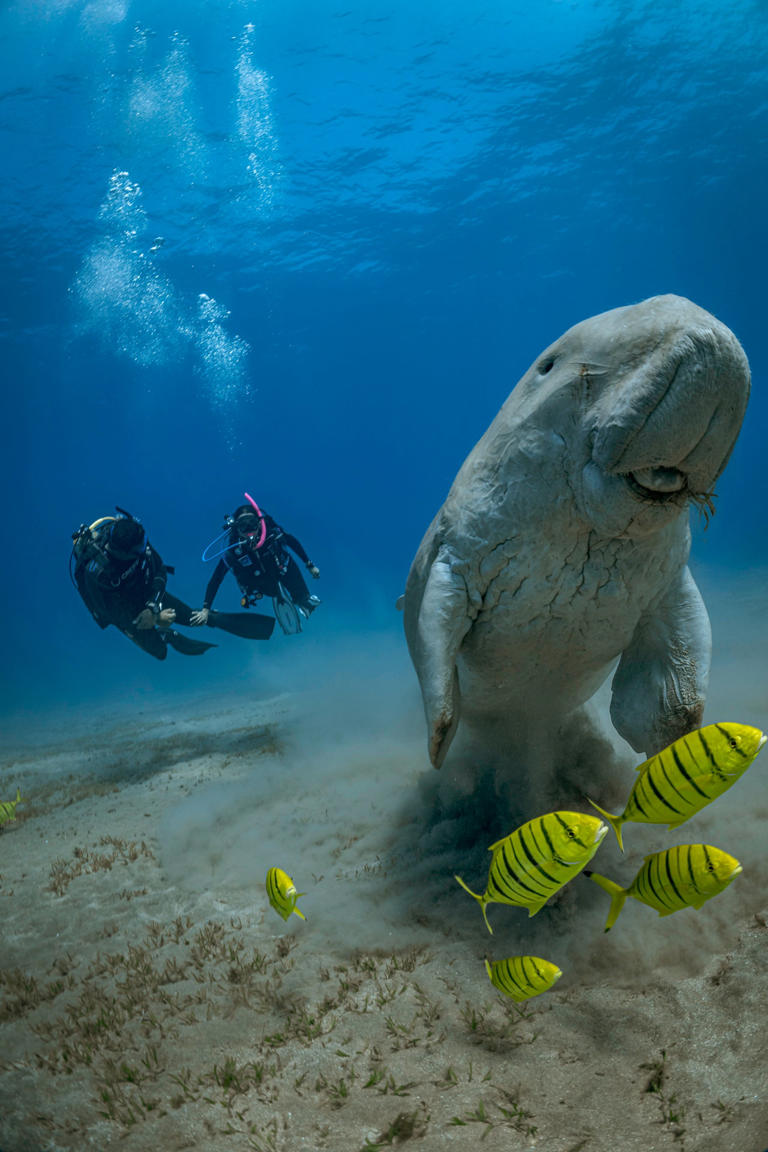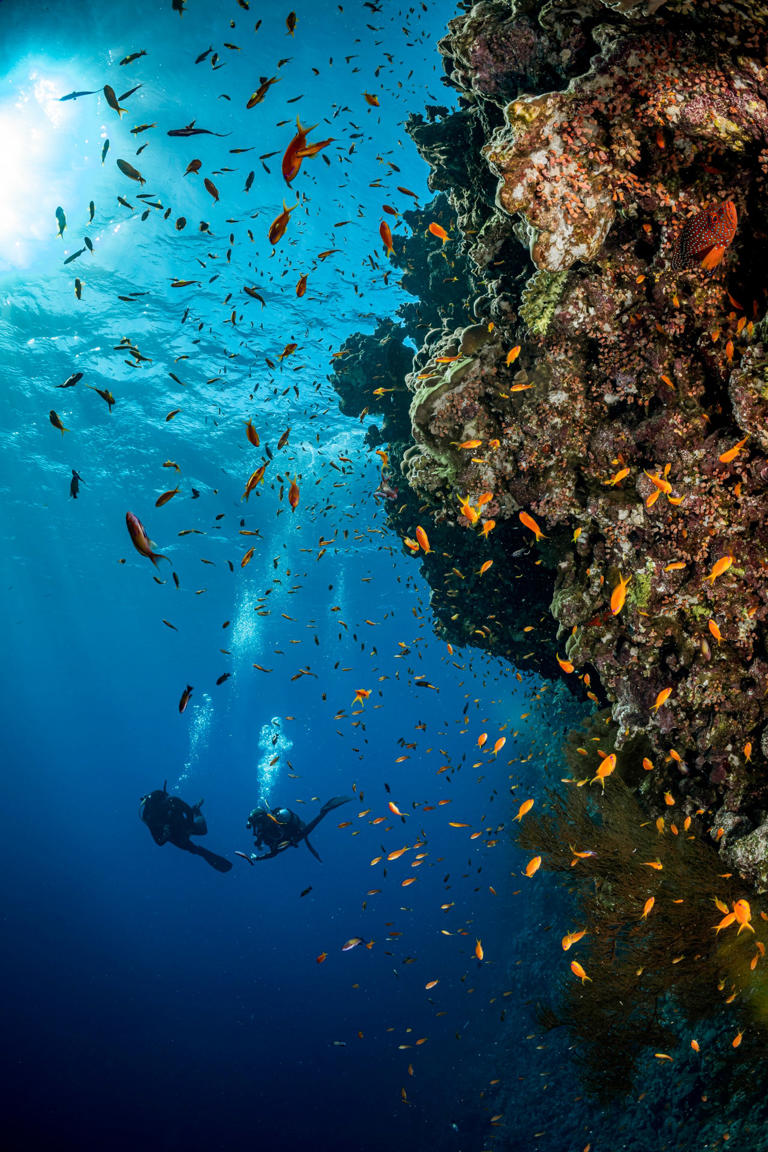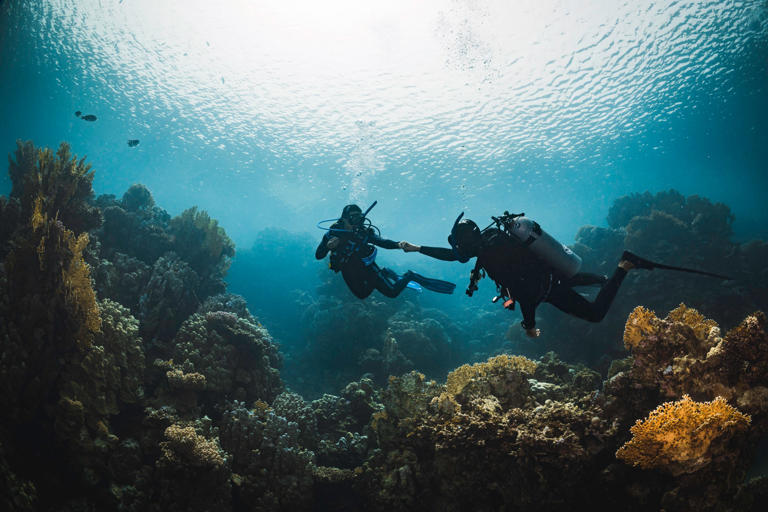All listings featured on Condé Nast Traveler are independently selected by our editors. If you purchase something through our links, we may earn an affiliate commission.
Hard and soft corals shimmer like confetti as reef fish swim busily past me, unfazed by my presence. Around me, pods of spinner dolphins socialize. In just a few days, I’ll dive alongside a dugong, a large, 1,000-pound manatee-like sea cow, and watch as it grazes on seagrass.
Also Read– Here’s How Telemarketers Keep Getting Your Number
I’m in Marsa Alam, Egypt, three-and-a-half hours south of the popular tourist destination of Hurghada, and I’m staying—and diving—with Red Sea Diving Safari. The Egyptian family-run ecotourism business, which has been a pioneer in conservation and sustainable resort operations for over 30 years, runs three diving resorts on Egypt’s Red Sea, including this one, Marsa Shagra; Marsa Nakari; and Wadi Lehem. It’s also one of the first certified PADI Eco Centers—a new accreditation created by the Professional Association of Diving Instructors, or PADI, in association with the United Nations Environment Program (UNEP), which recognizes and elevates the world’s most environmentally committed dive centers.
Launched this past Earth Day with 11 such designated centers, PADI developed the program in response to a 2022 Reef-World Foundation study, which found that 95 percent of divers want to book with sustainable operators, but struggle to book with confidence. The evaluation process is rigorous: To be a certified Eco Center, dive centers must show their commitment to protecting the ocean, in part by establishing marine-protected areas with PADI’s Adopt the Blue program, the largest network of underwater dive sites for marine conservation. They must also be Green Fins-certified, a program developed by UNEP and The Reef-World Foundation that IDs best practices around diver behavior, staff environmental training, and waste management.
“The PADI Eco Center credentials designate our members who exemplify environmental stewardship in their operations,” says Julie Andersen, Director of Global Brand for PADI Worldwide. “The ultimate goal is to connect ocean lovers with sustainability leaders in the dive industry through a rigorous verification that gives travelers the confidence that their tourism dollars are going to make a positive impact.”
PADI-certified and aspiring divers can now use the online PADI dive center search to find Eco Centers and book with dive shops like Red Sea Diving Safari, or one of the other Eco Centers the program launched with such as Mexico’s Dive Ninja Expeditions, Key Largo’s Silent World, or Oceans Unlimited in Costa Rica. Currently, there are more than 35 Eco Centers, with new ones certified and added to the list each month.
Also Read– Why You Never Want to See These Four Letters on Your Boarding Pass


In an additional bid to demonstrate their commitment to conservation, Red Sea Diving Safari also allows divers to complete their PADI Dive Against Debris specialty course free of charge. The course not only teaches them how to properly identify, remove, and report marine debris—it also emphasizes how to do so safely and responsibly.
“By offering the certification for free, we’re encouraging our guests to become ocean ambassadors, and help with the global data collection needed to understand the problem of trash in our seas—and how we can solve it,” explains Sarah O’Gorman, a Red Sea Diving Safari team member. “Some resorts might try and hide this reality, but that helps no one,” she says.
Also Read– Leave the sweatpants at home. Why we need a dress code for flying.
I took advantage of the gratis learning opportunity on my first day at Red Sea Diving Safari, sitting alongside a group of fellow diver-guests to glean the dos and don’ts of removing debris. The course highlighted elements of debris removal that can do more harm than good—like in the case of a glass bottle or tin can that has become part of the environment, housing organisms and animals—or why rope and netting should be left alone, but still reported, using GPS coordinates.
Later, my cohort, guided by instructor Hossam Abdel Aziz, entered the water via a shore dive from the private beachside dive center. Suited up in scuba gear, and armed with mesh trash bags, we swam around the bay picking up floating debris, like PAC-MAN going for his beloved treats. The juxtaposition of healthy, shimmering coral and sea life against man-made trash was jarring—but it motivated us to stash as much as we could in our bags. Collectively, we pulled out 603 pieces of trash that day, a total of 66 pounds comprising plastic water bottles, cigarette butts, takeout containers, and plastic shopping bags. As part of the reporting process, our survey was published online and joins nearly 20,000 surveys in the world’s largest underwater database.
Led by the PADI AWARE Foundation, the program also includes data from the South Pacific nation of Vanuatu, and played a crucial in the country’s decision to ban nonbiodegradable plastic bags in 2018. For this small island nation, Dive Against Debris collections provided integral, science-based data leading to measurable reductions in plastic use through government policy.
Also Read– Malaysia Airlines Eyes British Airways Business Seat For New Airbus A330neos

But divers (and non-divers) can also find opportunities to get involved with resort-based marine conservation programs beyond Eco Centers. The destination of Peninsula Papagayo in Costa Rica is engaging guests with its Coral Hero Program, which allows them to observe, participate, and contribute to coral restoration in a number of ways, from easy, land-based activities to more experienced scuba diving-based restoration outings alongside project co-founder and University of Costa Rica professor Dr. Juan José Alvarado. At Kokomo Island in Fiji, guests are invited to take part in all stages of their coral gardening project led by the Kokomo Marine Biology team that has, to date, transplanted more than 2,000 corals to the house reef and is making headway with its giant clam nursery, which will soon relocate juvenile giant clams to the house reef. They’ve also introduced an Adopt a Manta program that helps fund research about, and the protection of the manta rays that often visit the island. On the neighboring island of Viti Levu in Fiji, Beqa Adventure Divers’s marine-protected area advocacy work and shark conservation initiatives wouldn’t be possible without divers. Described as a “conservation group running a dive shop,” their funding is generated by dive trip revenue, as well as adoptions made through their PADI-recognized Adopt a Shark program.
Also Read– Aegean & Cyprus Airways To Announce Codeshare Agreement
On my last day with Red Sea, I was overwhelmed with hope as I witnessed the spellbinding beauty of healthy coral reefs at the Elphinstone Reef dive site. In the space of that moment, I remembered that as travelers—divers or not—it’s our responsibility to protect and repair the places we love; to give our time and effort to ensure their longevity for years to come.





























